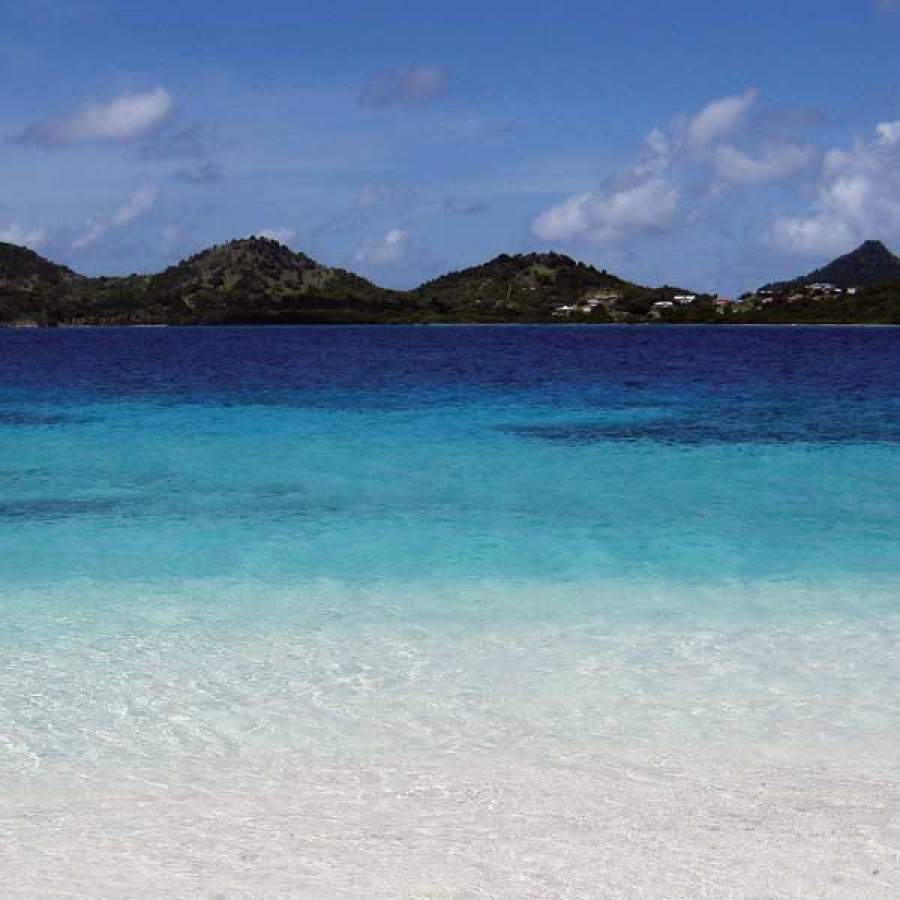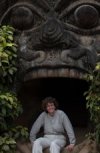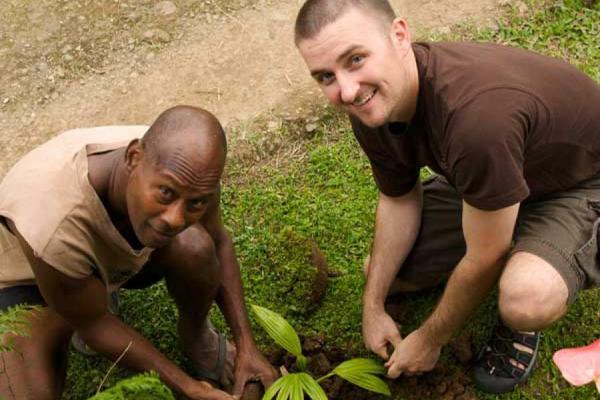When Walt Nathaniel graduated with an Honours degree in Business Administration, many of his fellow grads pursued highly-paid positions in shiny towers in downtown Toronto. Instead, Walt answered an ad on a university bulletin board and moved to an isolated island of about six thousand people, where he and several colleagues shared a cramped office with one phone in a concrete hurricane bunker.
The twenty-three year old from Aurora, Ontario was on a two-month volunteer placement with Youth Challenge International (YCI), on the hurricane-devastated island of Carriacou, off the coast of Grenada. With the Adolescent Development Agency (ADA) he helped young people, aged fourteen to twenty-one, establish their own income-generating activities.
The reason for Walt's choice dates back to the events of December 26, 2004, when he was on holiday with his parents in their native Sri Lanka.
"We were staying in Colombo, probably about two kilometres from the beach—we were actually visiting some family when the waves hit. All I remember seeing were these masses of people running through the street in hysteria."
The Nathaniels were horrified as the details of the tsunami's destruction became known.
"We were interested in helping out in the relief effort in the other parts of the country, but we weren't properly vaccinated to go out into those areas, and there was a lot of disease and infection going around," Walt explains. The experience of being abroad and unfortunately not being able to really be part of relief efforts made me want to get involved in something when the opportunity came up."
On Carriacou, Walt met Rita Abegao, who already had some international development work under her belt when she was hired to manage the ADA project for six months. Likewise, her life experiences sparked her interest.
"I think it may have had to do with being born in a different country, Portugal, moving and experiencing new cultures, as well as having a mother from Western Africa. From a very young age I understood the huge discrepancy in how people in the West lived compared to other parts of the world."
Walt and Rita found themselves in a place where the beauty of the landscape, with its deep green hills and white beaches, contrasted with the malaise of the youth.
"They seemed to be lost, or sort of hanging in limbo," says Rita. "So many people, since the 1950s, left the island in search of 'a better life' in England, Toronto, New York, even to some of the bigger islands in the Caribbean. They would work and send money and supplies back to Carriacou, making it appear that the newer generation might not have to work as hard as their elders to get things in life—family just sent it over. This lack of responsibility and lack of real development on the island, seem to have left the youth of Carriacou struggling to find their place in society." Many drop out of school at 14, and remain unemployed. Rates of drug and alcohol use and teen pregnancy are high.
Two hurricanes swept through in recent years, making things worse. In 2004, Hurricane Ivan flattened the main island of Grenada, wiping out the nutmeg industry and devastating the economy of the whole nation. The next year, Hurricane Emily hit Carriacou especially hard and damaged hundreds of buildings, including hotels, restaurants, schools and the hospital. Tourism infrastructure was blown away and travellers were afraid to return to the area—which was supposed to be outside the hurricane belt.
Houses could be fixed, but rebuilding young lives and replacing lost economic opportunities seemed equally important, and that was the focus of the Adolescent Development Agency programme.
Though lacking in jobs, Rita explains, the young people have plenty of exposure to TV and the internet. "They're heavily influenced by Western culture which all appears better, more glamourous, faster paced. It's as if they're caught in between tradition and the simple life, and pressure from the outside world to catch up in order to not get left behind. All the while, being 'stuck' on this little island."
The cure for boredom? Why not a little Taekwondo? That was one of many activities Rita and Walt organized with the ADA staff. "The first class was pretty hilarious," says Rita, "seeing all the staff, volunteers and myself trying to do kicks and yelling out in Korean."
"Carriacou is a place where the beauty of the landscape, with its deep green hills and white beaches, contrasts with the malaise of the youth."
They also organized nature walks, cooking classes and jewellery making. Through the activities, small transformations started to happen.
Rita describes one participant who came in by ferry every day from another island. "She was really shy with new people and always pretended to hate all the activities, but she ended up making the nicest jewellery." She used local shells, wire, string and beads brought by the volunteers.
The staff took some folk art made by the participants to a cultural fair on Grenada island, and this woman's jewellery was the best seller. "She really did enjoy doing the crafts," says Rita. "I think what she really loved was feeling that she was part of something." With the programme's support, she decided to re-take her high school graduation exams, and the volunteers helped her to study and prepare.
Meanwhile, Walt was busy surveying local business managers at restaurants, hotels, schools, construction companies, stores and government ministries, to find out what employees they might need and what qualities they were looking for. He and Rita visited high school classes to tell students about ADA and find out what kinds of support they needed to find jobs, or create their own.
"The main thing that makes this programme successful is that it is needs based," claims Rita. "Whatever help young people are looking for, ADA aims to help them and if it is beyond their means then they point the young person in the right direction, with constant follow-up." Rita observed a need for career guidance, coping skills and opportunities to "think outside the box."
All this research culminated in two career conferences in which the youth encountered some brand new ideas. In the first one, "Opportunity Knocks," Walt used his business background to do a presentation about entrepreneurship and small business. Three months later, at "Flash Forward," a Grenadian facilitator used drama and role playing to get youth excited about their future.
"You could tell the kids weren't used to this type of approach when learning, but they all got on board and enjoyed it," Rita observes.
The participants had to present business plans to a large funding organization, played by Rita and her colleagues. There were plans for a gas station, a spa and a movie theatre.
"Those who pitched the spa idea were envisioning something very posh yet affordable," says Rita. "What made their plan unique was simply the fact that nothing like that existed on the island. It was marketable because it would attract tourists during the right season, but also the ex-pats and Grenadians who had travelled overseas and were used to those kind of services. We commented that we'd be their first customers if it ever came to fruition!"
At the end of the conferences, some of the participants received scholarships and prizes. Rita witnessed how this made a difference in the life of one particularly withdrawn boy, who endured a lot of teasing.
"We decided to make him one of the winners because of how committed he was to participating in the conference. When he won he was shocked... he expressed so much appreciation that someone had believed in him, after being ostracized by his peers."
Along with these successes, the project had its challenges, and that's where the learning happened for Rita and Walt.
"One thing that I wasn't expecting was the slowness of the start," says Walt. "I went in wanting to be all gung ho and get things done. Adjusting to the pace of things in Carriacou took a bit of time, but I realized there were perks to the laid back life... like that extra time on the beach."
He encountered the "party-on" culture of the island when he attended a church fundraiser to bring in some wages for the pastor. "I went in expecting a nice quiet barbecue, but when we got there, I saw some of the drunkest people I've ever seen. There was a bar at the event—and the pastor was behind it, mixing drinks."
Along with the fun-loving flavour was some resistance, when serious topics came up. Rita noticed a tough exterior, which made the youth seem "defensive and unapproachable."
"It's as if they're caught in between tradition and the simple life, and pressure from the outside world to catch up in order to not get left behind."
"Whenever we had direct contact, most of them usually misbehaved, were really loud and disruptive. The volunteers and I would often leave the session feeling like we hadn't gotten through." The girls, however, were more likely to commit to the programme and to hang out at the centre.
Rita persisted and tried everything, using pop music and culture, to approach them "on their level." Sometimes that would backfire when the boys started flirting with her and trying to get her phone number.
"With time they realized that I was being sincere in trying to offer them help and support and they appreciated my experiences that I could share with them.” In the end, the most important accomplishment was the opening of a dialogue.
"Our objective wasn't necessarily to get anything tangible out of them right away," says Walt. "It was about getting them to start asking questions and thinking; sparking that curiosity and showing them realistic possibilities beyond the usual... and I think having some fresh ideas and faces, volunteers from abroad, really helped with that."
"I met a lot of really great people," he continues, "and I honestly think that I've gained much more from it than I could have possibly given back... a glimpse into a different view of the world; a willingness to get to know people that I may not have considered getting to know before. Also, knowing that your skills can be applied in ways that you wouldn't have originally thought."
Back home, Walt has taken a sales position at a graphics and paper company. "I've gone kinda corporate," he says, laughing, but he plans to do a longer international placement some day.
Rita had an opportunity to come to terms with her own heritage and race. "My mother is mixed Black and White from Angola in West Africa, and my dad is White from Portugal. It took me a long time to be really happy with my own identity. In Carriacou, through observing and taking part in many of the cultural traditions like big drum dancing, soca dancing; through chit chatting about men and life... I felt really close with some of the locals and learned to really appreciate and love being multi-racial."
Add this article to your reading list




